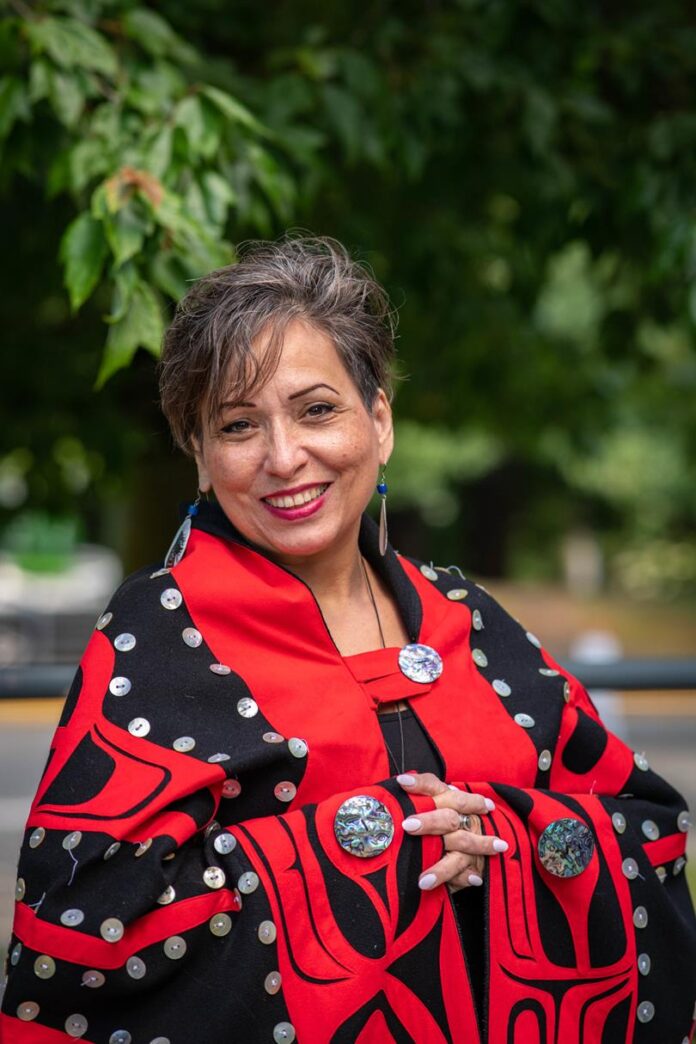Leading the way in diversity, equity, inclusion, and the preservation of Indigenous knowledge is Camille Callison, a respected member of the Tsesk’iya clan of the T?h?t?n First Nation. Callison, who became the University Librarian at the University of the Fraser Valley (UFV) in 2021, is committed to elevating Indigenous voices in libraries, galleries, archives, and museums through her work as the chair of the National Indigenous Knowledge and Language Alliance (NIKLA).
“[NIKLA is] really set up to be able to create an association that unifies and amplifies the voices of Indigenous people, so First Nations, native Inuit, in this country … and to network and through that community of practice related to Indigenous knowledge, horticultural memory, language, Indigenous ways of knowing, and [how] we relate to each other.” Reflecting on her Respectful Terminology Platform Project (RTTP) which she co-leads with Stacy Allison-Cassin, she added, “One of the things that I’ve been really dedicated to [is] being able to ensure diversity.” Callison also mentioned the importance of phrasing and her hopes to see more appropriate terminology when referring to First Nations people. “We really want to be able to create terminology that is respectful no matter what race, religion, status in society, gender, sexuality, or even age.”
Her path to becoming a librarian wasn’t an easy one. Callison originally intended to pursue a profession in accounting, but after learning about anthropology, her plans altered. “I believe that’s what a university degree does for people; it allows you to be able to pursue dreams, and some of the dreams you may not know,” said Callison.
Through a work-study program at UBC’s Xwi7xwa Library, Callison, with renowned elder and mentor Dr. Gene Joseph, came to see the potential of libraries as keepers of culture and the art of preserving it. “I was much more comfortable being over the mountains, riding horses with my dad and others, [but] I wanted to be on the land, documenting our knowledge … working in archaeology and working more with tangible knowledge, rather than the intangible.”
The Ron MacDonald Outstanding Service Award recognizes Callison’s commitment to the library and archives community, her passion for Indigenous ways of knowing, and her current PhD pursuit at the University of Manitoba. Callison’s PhD research in anthropology lies at the intersection between memory institutions and Indigenous knowledge, languages, and cultures. She considers this recognition to be a tribute to Indigenous community and the mentors, knowledge keepers, and elders that helped her along the way.
“I acknowledge my elders and knowledge keepers and mentors … their wisdom continues to guide me and shape my journey. But I also acknowledge the people who have stood beside me … and created more inclusive and respectful knowledge infrastructures that include many diverse voices. I think that’s critically important … because no one person can do this work by [themself],” she emphasized. “It was very rewarding to be acknowledged in that way, because that doesn’t often happen for people, and there’s many people who work very hard and never [get] acknowledged … It was important for me to also share with other people working in this field,” she added. “I was incredibly honoured and humbled that I was nominated.”
Her impact is not just limited to Indigenous communities, but also extends to the students and librarians she mentors. “That’s always been my passion … working with students and ensuring they have the resources they need to be successful and to stay in their degree programs … I will say that I’ve had many students who are about to withdraw, and they spent some time with a librarian — some of them with me — who then kept on in their studies and realized that they could do it.”
According to Callison, the library is a resource for lifelong learning and empowerment. “If you fish for somebody… they’re only going to be able to eat that one meal, but if you teach them to fish … then they’re going to be able to feed themselves for the rest of their lives.”
Her efforts and commitment are a powerful reminder that cultural preservation and diversity are valuable in education. “It was really an opportunity to uplift Indigenous voices and to uplift the voices of our allies that we’ve been working with.” She believes it is critical to remind people that the path of reconciliation is not an aspiration; “It’s a marathon and we’re moving toward creating more reconciliation — but we’re not there … how do we continue to move toward that more respectful and inclusive future for all Canadians?”

Hello, I’m Gauri Sethi, a passionate staff writer at the Cascade responsible for writing content that resonates with the masses. Currently, I am pursuing business administration, but deep down, I am a person who loves expressing herself through writing.


